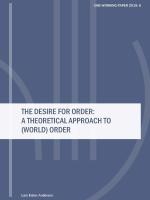What is (world) order?
Thirty years ago, a new world order was announced. After the Cold War the world would be a peaceful place and conflicts would be solved multilaterally. In the West it was expected that the only superpower and ‘leader of the free world’, the US, would indeed lead the fulfilment of the new world order. Russia, China, and other power centres understood world order differently. As did transnational jihadists. Thirty years after, the same politicians and scholars in international relations that announced the new world order are now arguing for the end of a liberal world order. The world is facing a future with competition and rivalry between the great powers. The US prioritizes the ‘America First’ policy, China is a rising power and Russia challenges the American position in the world, especially in Eastern Europe and the Middle East.
Still we are talking about ‘world order’. But what does order mean? What is order more precisely? In this Working Paper, DIIS Senior Researcher Lars Erslev Andersen develops a theoretical approach to the understanding of (world) order.
Based on the philosophies of Immanuel Kant and Arthur Schopenhauer, and including Albert Einstein’s theories, this approach proposes a definition of the will to life as the desire for order. This is put into perspective using Friedrich Nietzsche’s determination of two fundamental desires based on his studies of Greek tragedy; the Apollonian and the Dionysian. The approach discusses and proposes several theories about world order to be rethought based on the definition of world order as will and representation and the will to life as the desire for order. Inspired by the paradigm shifts that have changed the interpretation of Nature in theoretical physics since Einstein’s theory on gravitation and the development of quantum mechanics it argues that time has come for a theoretical paradigm shift in the study and understanding of international relations.
DIIS Experts


